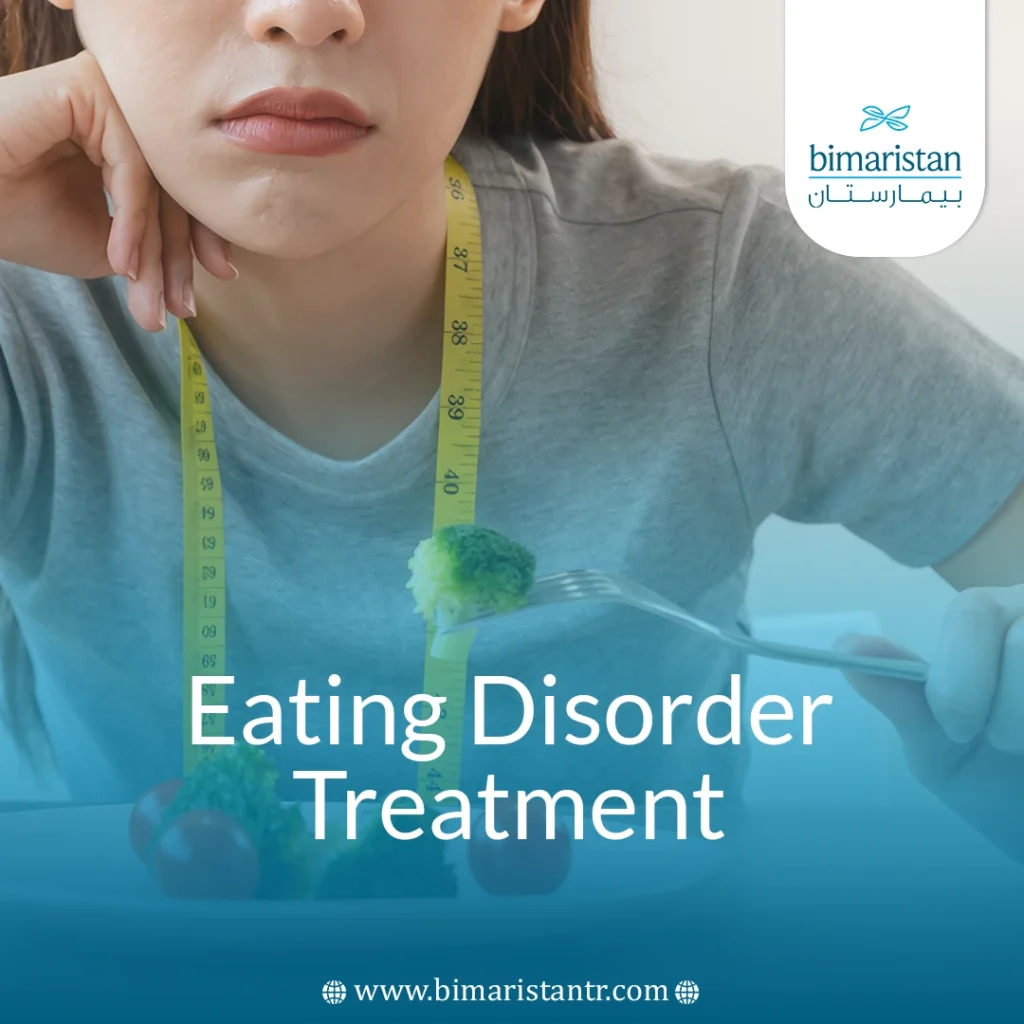Eating disorders are serious psychological conditions that affect an individual’s relationship with food, where eating is used as a way to cope with emotions or stress. These disorders may manifest themselves by eating too much or too little food or by excessive preoccupation with weight and body shape. They are not limited to a specific age group but are often seen among adolescents and young adults.
These disorders can cause significant physical and psychological damage, including to the heart, digestive system, bones, and mental health. However, early and specialized eating disorder treatment helps most patients regain a healthy lifestyle.
What are eating disorders?
Eating disorders are a group of abnormal eating behaviors that arise as a result of complex psychological and social factors and lead to serious health effects on the body and mind:
- Anorexia nervosa: A person abstains from food excessively due to an intense fear of gaining weight, often due to negative body image, social pressures, or excessive perfectionism.
- Bulimia: Bouts of binge eating followed by compensatory behaviors such as vomiting or laxative use, and is associated with feelings of guilt, low self-esteem, or mood disorders.
- Binge eating disorder: Repeated episodes of binge eating with loss of control and lack of compensation (e.g. vomiting) leading to weight gain and negative feelings, often associated with psychological factors, and is the most common eating disorder.
- Binge Eating Disorder: Avoidance of certain types of food due to an aversion to taste or texture or fear of vomiting, rather than a fear of weight gain or negative body image, usually seen in children or those with autism or hyperkinetic disorder.
- Pica disorder: Eating non-food items such as dirt, paper, or soap, and may be related to iron or zinc deficiencies, or developmental disorders.
- Rumination disorder: The regurgitation of food after swallowing and then re-chewing or spitting it out, often associated with stress or neurological regulation issues.
Why do we need eating disorder treatment?
Eating disorders are not just changes in eating habits; they are complex psychological conditions that affect physical and mental health and can lead to serious complications if not treated in time. These complications include issues with the heart, digestive system, bones, and teeth, as well as psychological disorders such as depression and anxiety, and even suicidal thoughts.
Early eating disorder treatment helps to improve the chances of recovery and reduce the risk of relapse, as it contributes to stabilizing physical health, addressing deep psychological causes, and rebuilding a healthy relationship with food. Noting that neglecting eating disorder treatment may lead to worsening symptoms, making recovery more difficult, and increasing the risk of health and psychological complications.
Types of eating disorder treatment
Eating disorder treatment involves a comprehensive approach that aims to correct eating behaviors and improve physical and psychological health. The choice of treatment varies according to the type of disorder and the severity of symptoms, and the most prominent types of treatment include:
Cognitive-behavioral therapy
Cognitive-behavioral therapy (CBT) is the most commonly used treatment for eating disorders, helping patients change negative thoughts and behaviors about food and the body, which improves mental health and reduces episodes of compulsive eating:
- Dialectical Behavioral Therapy (DBT): Focuses on regulating emotions and improving the ability to cope with stress, and is suitable for those with severe emotional disturbances and mood swings that affect eating behaviors.
- Integrated Emotional Behavioral Therapy (IBT): IBT analyzes the relationship between emotions and eating behaviors, helping patients understand their emotional triggers and develop healthy coping mechanisms.

Nutritional intervention and nutritional support
Nutritional intervention aims to correct unhealthy eating habits and restore nutritional balance by:
- Improving your relationship with food through proper dietary plans
- Restoring a healthy weight for undernourished people
- Teaching the basics of proper nutrition to avoid relapse
A dietitian plays an important role in implementing these strategies, helping patients understand their body’s needs, creating individualized nutritional plans for their health condition, monitoring their progress, and ensuring that nutritional therapy is coordinated with the medical team to ensure a balanced and sustainable recovery.
Medicines and pharmaceutical support
Eating disorder treatment with pharmacotherapy is not used as a standalone solution but helps manage symptoms, especially when combined with psychological and nutritional therapy. Medications have not been shown to be effective in weight gain or treating anorexia nervosa, but they are used in cases of bulimia and binge eating disorder to reduce the desire to overeat or purge. Antidepressants and appetite suppressants, such as Vyvanse, can help improve mood and regulate appetite, but the use of these treatments must be under medical supervision to ensure the desired benefit and avoid possible complications.
Multidisciplinary treatment
This approach combines psychiatry, nutrition, occupational therapy and community support to ensure a comprehensive and sustainable recovery, aiming to address the psychological and physical aspects of eating disorders through balanced dietary plans, improving the relationship with food and social support to prevent relapse, while a specialized team works to provide an individualized treatment strategy based on an accurate diagnosis to ensure the best results.
Steps to implementing an effective treatment program
The eating disorder treatment program begins with an accurate diagnosis to determine the patient’s needs, then a treatment plan is developed that includes behavioral therapy, nutritional intervention, and pharmacological support when needed. The program focuses on improving the relationship with food and restoring a healthy balance with continuous follow-up to assess progress and adjust plans according to the patient’s response. Community support is an important part of ensuring an environment conducive to recovery and relapse prevention, making treatment more effective and sustainable.
Success stories and effective statistics
Research has shown that 60% of people who receive eating disorder treatment achieve full recovery, while mortality rates associated with eating disorders are reduced from 20% to 2–3% with proper treatment. Among the inspiring success stories, Jordan Kernen was able to reclaim her life after treatment at a specialized center and became a teacher who supports her students psychologically. Amanda overcame anorexia nervosa through intensive treatment, giving her a more balanced and stable life.
Finally, early intervention is essential to ensure successful eating disorder treatment and sustainable recovery. The earlier treatment begins, the greater the chances of improving the relationship with food and restoring physical and psychological health. Specialized medical support and proper guidance are key factors in the success of eating disorder treatment, contributing to lower relapse rates and promoting long-term health stability.
Sources:
- NHS. (2024, January 23). Overview – Eating disorders. NHS.
- National Institute of Mental Health. (2024, October). Eating disorders: What you need to know . U.S. Department of Health and Human Services.
